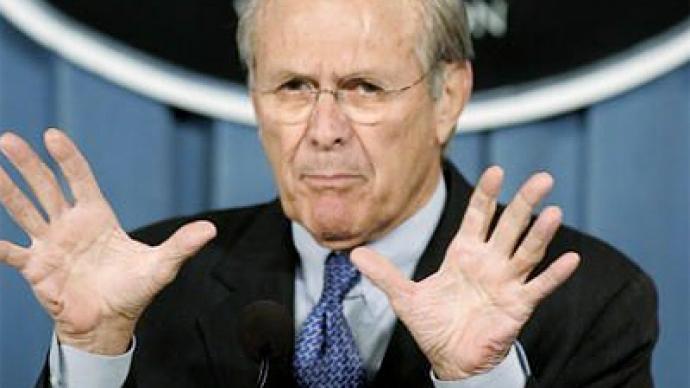Former US Secretary of Defense Donald Rumsfeld has lifted the lid on life inside the war on terror with his newly published memoirs.
Entitled "Known and Unknown," it charts how he served under two American presidents, Gerald Ford and George W. Bush. By publishing his memoirs, Rumsfeld, just like Bush before him, tries to create a new history based on fiction, argues Brian Becker from the anti-war ANSWER coalition. “You cannot help to think about the old cliché that history is nothing but fiction, agreed upon,” he said. “The fiction is that the war in Iraq was justified, that they did the right thing,” he added. “They spent hundreds of billions of dollars, perhaps up to $2 trillion, in a war which took the lives of a million Iraqis according to the Lancet medical journal.” However, Becker thinks the book will have almost no impact because people can see for themselves that the war in Iraq was an absolute catastrophe, as America’s image is completely ruined around the world and Iraq is a broken country. “This is a self-serving journal, a revenge memoir in some way – nothing but a self-serving action,” Becker declared. “The history is clear for all to see right now.” Becker explains that Rumsfeld was the one who helped to set up, along with the CIA, not only the Guantanamo Bay detainment facility, but all sorts of “black hole” prisons and secret detention centers where people were tortured and murdered. And now along with Bush, who published his memoirs in November 2010, he is trying to show his actions were right and justified, Becker claimed. “They want to rescue their image, they want the American corporate media to treat them kindly, they want, of course, as they do constantly, to make millions of dollars from this promotion,” Becker told RT.
Eric Stoner, editor for the news and analysis blog Waging Nonviolence, says the record shows that both Donald Rumsfeld and George W. Bush were “itching for a war.”“Rumsfeld, in particular, had been calling for a war long before he was in the administration,” Stoner said. “In 1998, he signed a letter put up by the Project for the New American Century which called for Clinton to launch a military attack against Iraq. So, he has been wanting war for a long time. And also, there are memoirs that came out right after 9/11, actually within hours of the attack. Rumsfeld ordered his aids to look for any evidence they could find that could link Osama Bin Laden to Saddam Hussein. So, he was immediately looking to take the war to Iraq after 9/11 happened.”
Michael O'Brien, a former US contractor and author of “America’s Failure in Iraq,” says Donald Rumsfeld still refuses to take responsibility for his actions.“I think it’ll hurt his reputation because he doesn’t really take responsibility for poorly executing the war,” O'Brien said. “It was his war, he prosecuted it. He blames all these other people, but he was the one responsible for executing the conflict, no one else. I really do believe that it will be like Robert McNamara in Vietnam. I do not think this is going to help Donald Rumsfeld’s reputation. It’s just a book to try and use his selective memory to describe what happened in his own words.”
Pratap Chatterjee from the Center for American Progress says Rumsfeld’s book is likely to annoy some senior Republicans.“In the book he blames George W. Bush, he also blames Colin Powell, Condoleezza Rice for a lot of mistakes,” Chatterjee said. “It’s a very self-serving book which proclaims him to have known everything and to condemn other people, and I think this is something that other Republicans, even John McCain, are not very happy about.”“What I was hoping for that in the book was at least some acknowledgement that he had made mistakes,” he added. “But the only thing he seems to have acknowledged is the idea that he should have resigned after the Abu Ghraib scandals. Now, in reality, he did resign twice, and Bush didn’t accept it. But I think for the 5,000 or so American soldiers who died there and the hundreds of thousands of Iraqis that died, in addition to the people who were tortured in Abu Ghraib, the least they could have expected is an apology.”Chatterjee says that instead of an apology, Rumsfeld’s book suggests that he should have gone to war sooner.“He suggests that he should have bombed Iraq when Colin Powell was making a speech, and so it suggests that nothing has been learned from the lessons of last few years, and he suffers no regrets whatsoever,” Chatterjee concluded.

